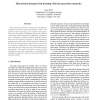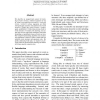246 search results - page 10 / 50 » Learning to Predict Rare Events in Event Sequences |
EDUTAINMENT
2007
Springer
14 years 1 months ago
2007
Springer
Most storytelling model approaches consider stories formed by sequences of a particular type of event. These sequences are mostly constructed using the inherent temporal characteri...
ICML
2000
IEEE
14 years 8 months ago
2000
IEEE
We consider the problem of unsupervised classification of temporal sequences of facial expressions in video. This problem arises in the design of an adaptive visual agent, which m...
ACL
2009
13 years 5 months ago
2009
We describe an unsupervised system for learning narrative schemas, coherent sequences or sets of events (arrested(POLICE,SUSPECT), convicted( JUDGE, SUSPECT)) whose arguments are ...
ICCV
2011
IEEE
12 years 7 months ago
2011
IEEE
In this paper, we present an event parsing algorithm based on Stochastic Context Sensitive Grammar (SCSG) for understanding events, inferring the goal of agents, and predicting th...
BIBM
2008
IEEE
14 years 2 months ago
2008
IEEE
Alternative splicing is a mechanism for generating different gene transcripts (called isoforms) from the same genomic sequence. Finding alternative splicing events experimentally ...


